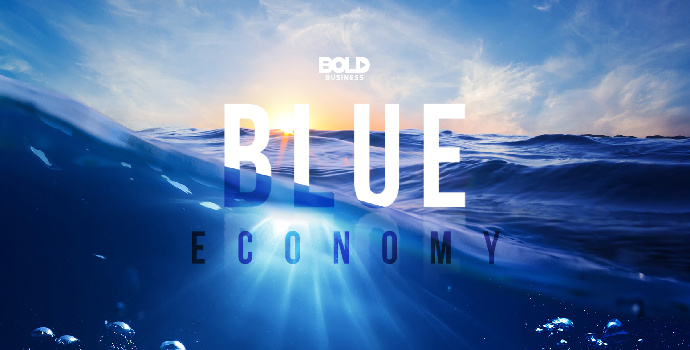Government Optimizes Implementation of Blue Economy in Marine Exploration
By: Devi Putri Anjani )*
Indonesia, with all its maritime wealth, is now at a crucial point in optimizing the implementation of the blue economy. This step not only aims to maximize the economic potential of the sea, but also to ensure the sustainability of natural resources for future generations.
The blue economy approach, which emphasizes sustainable exploration of marine resources, has become the government’s main focus. The Coordinating Minister for Maritime Affairs and Investment, Luhut Binsar Pandjaitan, emphasized that implementing the blue economy is not just an option, but a necessity to maintain our survival.
Indonesia’s oceans, which cover more than 70 percent of the country’s territory, are not just vast expanses of water. The ocean is a source of life that regulates climate, provides food, and offers tremendous economic potential. At the launch of the marine resources balance sheet in Sanur, Denpasar, Bali, Luhut underlined that the blue economy focuses on the sustainable use of maritime resources for economic growth, job creation and the health of marine ecosystems.
New, renewable energy and tourism are the main sectors in this blue economy approach. These two sectors not only create jobs but also encourage economic growth. The fisheries sector, for example, contributes more than 270 billion US dollars per year to Indonesia’s gross domestic product (GDP). If managed sustainably, this sector can guarantee the availability of capture fisheries resources for the future.
Waste management is also an integral part of the blue economy. Discipline in processing waste and encouraging the management of waste into energy or other forms is very important to reduce waste entering the sea. Luhut emphasized the importance of collective efforts from all parties to keep the sea clean.
Indonesia, with 17,500 islands and an estimated population of 281.6 million people, has enormous maritime potential. In marine resources, there is rich biodiversity, the potential for sustainable fisheries production is up to 12 million tons per year, and the potential for fisheries production reaches more than 50 million tons per year. Apart from that, there is potential for new renewable energy and blue carbon that can be developed further.
The existence of Indonesian waters also plays an important role in global trade. It is estimated that 45 percent of world trade passes through Indonesian waters. In addition, 115 thousand kilometers of submarine cables that support national and global digitalization run across Indonesia’s territorial waters. However, this potential has not been fully managed optimally.
The fisheries processing industry, for example, still has a low contribution to GDP, only reaching 3.68 percent in 2022. In fact, Indonesia has main commodities such as seaweed, shrimp, lobster, crab and tilapia. The growth of the marine sector in relation to GDP is also still lower than national GDP growth. The GDP value of the fisheries sector in 2022 will reach IDR 1,551.2 trillion, an increase compared to 2021 which reached IDR 1,348.4 trillion.
Deputy for Maritime Resources Coordination at the Coordinating Ministry for Maritime Affairs and Fisheries, Firman Hidayat, highlighted the need for encouragement in the maritime subsector, especially in terms of industrialization. The contribution of the maritime processing industry is still very low, around 4.16 percent.
Indonesia has 12 million hectares of sea area that can be used for cultivation, but up to now only 0.8 percent has been used for seaweed. This figure is relatively low compared to other countries such as Japan and the Philippines. Indonesia has a geographical advantage with sunlight that shines all year round, allowing seaweed to be harvested all year round. This seaweed can be processed into various products of high economic value, such as biostimulants which can reduce fertilizer subsidies, food products, biodegradable plastics, and biofuel mixtures to reduce dependence on imported fuel.
Other maritime resources, such as waves, tidal energy and wind, have also not been utilized optimally for new renewable energy. The economic potential of maritime is increasingly wide open and can be developed through research and technology. Collaboration with various parties is needed to explore and utilize maritime resources by prioritizing sustainability aspects.
This sustainability effect is very important because it has a direct impact on life on earth. The ocean is capable of absorbing 50-80 percent of oxygen and 30-70 percent of carbon dioxide, as well as absorbing 90 percent of the earth’s excess heat. Maintaining ocean sustainability is the key to the survival of life on earth.
The blue economy approach promoted by the Indonesian government is a strategic step to optimize this extraordinary maritime potential. By prioritizing sustainability, Indonesia can not only develop its economy but also maintain the balance of the marine ecosystem.
This step requires commitment and cooperation from all parties, including government, industry and society. The successful implementation of the blue economy will bring great benefits, not only to Indonesia but also to the world. So, let’s support and be actively involved in efforts to protect and utilize our marine resources wisely.
)* The author is a Media Ambassador Contributor
